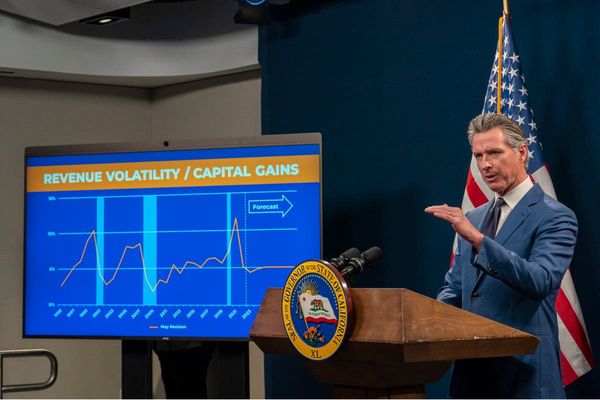
Jeremy Hunt has been accused of abandoning children disrupted by the concrete crisis in schools after the government admitted there will be no extra cash for the education budget to cover repair costs and closures.
As dozens of schools shut buildings for weeks and prepare to evacuate children to other sites as the new term begins, Whitehall sources said additional costs for headteachers – such as transport to alternative schools and catering – will not be covered by central government.
The deepening row over the presence of reinforced autoclaved aerated concrete (Raac) in schools, which is threatening to dominate parliament this week, comes after the chancellor said the government would “spend what it takes” to deal with the crisis.
Hunt told the BBC’s Sunday with Laura Kuenssberg that he would not speculate on the potential cost of fixing the problem, but said: “We will spend what it takes to make sure children can go to school safely, yes.”
But hours later, Treasury sources briefed that any such funding will come from the Department for Education’s existing budget for buildings – and not from additional funds.
Whitehall sources said schools, academies and local authorities forced to bus their pupils to alternative sites will not be given extra cash either.
Callout
The briefings have prompted Labour, union leaders and a senior Conservative to demand clarity from ministers about who will pay for the fallout from the Raac crisis.
Priti Patel, the Tory former home secretary who has five schools with Raac facing closures in her Essex constituency of Witham, said the government should offer money to help schools struggling with the crisis.
“Many of the affected schools are maintained local authority schools and single academy trusts which cannot afford the costs of repairs,” she told the Guardian.
“It is also unrealistic to place the funding burden on local councils which are already feeling the brunt of national policy costs.”
Daniel Kebede, general secretary of the National Education Union, said it was “essential that all costs are covered by government, not this halfway house where school leaders are uncertain and unable to trust government guidance as to what costs will be incurred by their school”.
Mike Short, head of education for Unison, said: “When the chancellor promises he’ll do ‘whatever it takes’, he must do just that. Offering nothing extra is totally at odds with his own pledge.”
Research published by the House of Commons library found that between 2009-10 and 2021-22, the DfE’s capital spending budget fell by about 50% in real terms.
Furthermore, the Raac crisis has been compounded by the longstanding problem of asbestos in school buildings.
Bridget Phillipson, the shadow education secretary, said the crisis stemmed from the Conservatives’ decision in 2010 to axe the Building Schools for the Future programme – the investment strategy introduced under Tony Blair – and what she described as repeated raids on education capital budgets.
“Using already-allocated money to just make safe school buildings with Raac is funnelling money away from other necessary work to upgrade schools and remove dangerous asbestos, storing up problems for the future,” she said.
Hundreds of specialist surveyors are being sent to schools known to be have been constructed to varying degrees with Raac to assess their safety from Monday.
More than 150 schools were told last week – days before they were due to reopen – that they would have to close buildings containing the material. According to a National Audit Office (NAO) report published in June, the DfE has identified 572 schools that may contain the material.
But hundreds of schools are yet to reply to the DfE’s request for information on their buildings. Last year the Office of Government Property issued a notice that stated: “Visually, Raac planks may look the same as precast concrete, and may be hidden above false ceilings.”
Geoffrey Clifton-Brown, a chartered surveyor and a Tory member of parliament’s public accounts committee – which has examined the crumbling concrete crisis – said it will take the government until the end of this year to examine every school for Raac.
“As a matter of urgency, we should ensure that the remaining schools are surveyed, which I understand will take until the end of the year,” he said. “Everything can look fine one day and then a roof collapses the next day. This must be our priority.”
Dozens of schools are preparing evacuation plans for pupils to other schools or to portable classrooms, leading to disruption for pupils and staff, who will have to be transported by coach or minibus.
The DfE has told schools and school trusts the department will pay for remedial costs, propping and portable classrooms for schools.
However, Whitehall sources said the DfE will not pay for additional transport costs while another source said the government will not pay for additional catering costs.
A DfE source confirmed on Sunday evening that additional transport costs will not be supported by central funds, but added that the department “will work with schools to review funding on a case-by-case basis”.
Schools should speak to their school catering team or provider about the best arrangements for providing school meals for pupils in this situation, the DfE source said.
Lydia Hyde, a Labour councillor from Southend, Essex, said additional costs will be a crucial issue in her ward for Kingsdown school, a special educational needs centre for children with complex needs including cerebral palsy, Down’s syndrome and autism.
The school is preparing to send dozens of pupils to alternative sites but should not be asked by Hunt to pay from existing funds, she said.
“The chancellor cannot say he is going to pay whatever is needed and then it turns out that there are these hidden extras,” she said.
“The government cannot rely on schools with very little money to pay to transport these children and not help out.”
Engineers have warned that Raac, which was used by builders between the 1950s and 1980s and is often described as “Aero bar” concrete, can become unstable when it exceeds its 30-year lifespan.
Phil Purnell, professor of materials and structures at the University of Leeds, said Raac “planks” were reinforced with steel bars and dipped in a coating such as bitumen to prevent water getting in.
“When this coating goes because it’s not maintained, the plank starts to crack. We have known about the issues of longevity and collapse since about 1992,” Purnell said. Unlike normal concrete or timber, Raac can fail “with very little warning”, Purnell added.
As parliament returns, Labour plans to put forward a humble address – an arcane parliamentary mechanism sometimes used to demand papers from government departments – to force the publication of a list of affected schools. The government has so far declined to publish it.







